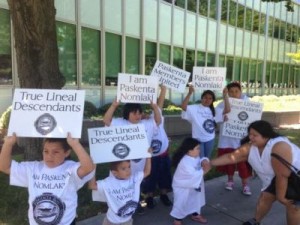Demand Tribal Council makeup be put to a vote
By Chip Thompson, Red Bluff Daily News

SACRAMENTO >> Around 120 members of the Paskenta band of Nomlaki Indians, led by Chairman Andrew Freeman, traveled by bus Thursday to deliver petitions to Central California Superintendent of the Bureau of Indian Affairs Troy Burdick calling for affirmation of a Tribal Council elected in May.
The group is demanding the BIA allow the tribe to exercise its sovereign right to determine the tribe’s governing body, according to a press release issued Thursday morning.
The move comes in response to a letter Burdick issued Monday recognizing Freeman and four ousted members of the tribe as the last uncontested, duly elected Tribal Council.
David Swearinger, vice chairman; Leslie Loshe, treasurer and Geraldine Freeman, secretary were removed from the Tribal Council during an April 12 General Council meeting of the tribe. Allen Swearinger, member at large, did not attend a subsequent meeting in May and was replaced on the Tribal Council as a result.
A “Tribal Police” force of about 30 armed men in uniform representing the ousted members attempted early Monday to shut down Rolling Hills Casino, which is owned by the tribe and remains open under those aligned with Andrew Freeman. Armed security employed by the casino prevented the shutdown, but a standoff continues at the Corning property.
The tribal members aligned with Andrew Freeman claim the tribe’s constitution allows the voting members of the tribe to submit 30 percent of their signatures in order to propose legislation for the tribe. The signatures of members were gathered to be submitted to Geraldine Freeman, whom Burdick’s letter recognizes as secretary.
Under the tribe’s constitution, when 30 percent of the tribe’s eligible voters sign an initiative it must be certified by the tribal secretary and voted on by the Tribal Council. If the Tribal Council rejects the initiative, then the tribal members must be provided the opportunity to vote on the matter, according to the release.
Upon receipt of the signatures, the BIA is prohibited from interfering with or disrupting the tribal process, thereby allowing the tribe to resolve the dispute pursuant to the tribe’s own governing documents and processes, the release said.
